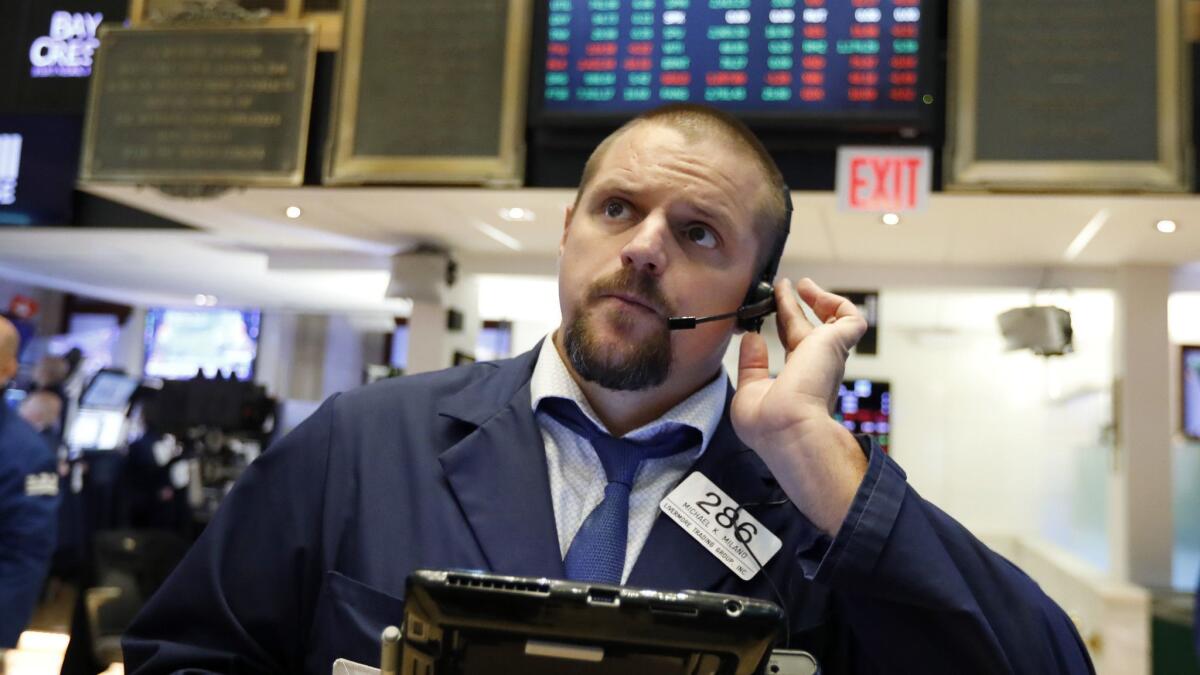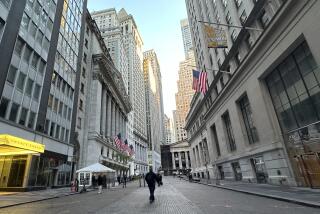Stocks rise, pushing Dow and S&P 500 to new record highs

Wall Street delivered another set of milestones Thursday as a wave of buying sent U.S. stocks solidly higher, driving the Dow Jones industrial average and the Standard & Poorâs 500 index to new record highs.
Technology firms, banks and healthcare companies accounted for much of the broad rally. Energy companies declined along with crude oil prices.
A weaker dollar, which helps U.S. exporters, and a mix of mostly encouraging economic reports helped put investors in a buying mood. That was a turnaround from earlier in the week, when the United States and China each announced a new round of tariffs on each otherâs goods, triggering a sell-off.
âSome of the economic data that came out today continued to show strength,â said Lindsey Bell, an investment strategist at CFRA. âGiven the strength in the economy, backed by the stimulus from tax reform as well as just fiscal stimulus in general, that should be able to offset some of the impact that weâre going to get from tariffs as we go into the end of the year.â
The S&P 500 index rose 22.80 points, or 0.8%, to 2,930.75, beating the high it set last month. The Dow climbed 251.22 points, or 1%, to 26,656.98, topping the record it set in January. The Nasdaq composite climbed 78.19 points, or 1%, to 8,028.23. The Russell 2000 index of smaller-company stocks climbed 17.25 points, or 1%, to 1,720.18.
The Dow, S&P 500 and Nasdaq are on track to end the week with a gain.
The Dow and S&P 500 were on course to set record highs from the get-go Thursday as investors pored through a batch of economic data.
The Labor Departmentâs weekly tally of applications for unemployment aid was lower than expected, with claims slipping last week to 201,000 â the lowest level since November 1969.
An economic index from the Federal Reserve Bank of Philadelphia also topped forecasts, and the Conference Boardâs index of leading economic indicators, designed to anticipate economic conditions three to six months out, rose 0.4% last month. Although that came in slightly below forecasts, it still suggests the economy is on sure footing, said Tracie McMillion, global head of asset allocation for Wells Fargo Investment Institute.
âWith a [reading] that high, itâs very unlikely that thereâs a recession on the horizon,â McMillion said. âThe U.S. market is responding to this foundation of economic strength. Pair that with a dollar that has started to depreciate a little bit, and thatâs good news for U.S. companies that trade abroad.â
A weaker dollar is particularly favorable for large-cap companies that do business overseas because it makes their products less expensive there.
Mixed data on U.S. home sales and mortgage rates weighed on homebuilding stocks.
The National Assn. of Realtors said sales of previously occupied homes were flat in August after declining the previous four months. Separately, mortgage buyer Freddie Mac said the average rate on 30-year, fixed-rate mortgages jumped to 4.65% this week, the highest level since May.
William Lyon Homes shares tumbled 7.8% to $17.20.
Starting Monday, the U.S. will place a 10% tariff on $200 billion worth of Chinese goods. The tariffs will rise to 25% on Jan 1. Beijing has said it would take âcounter measures,â which includes hitting $60 billion worth of U.S. imports â including coffee, honey and industrial chemicals â with retaliatory tariffs.
âPart of why youâre seeing such significant upside today is the amount of the tariffs was less than expected,â Bell said. âThe market is still optimistic that we will resolve this issue, perhaps not before the midterm [elections], but hopefully before the end of the year.â
Tech and healthcare powered much of Thursdayâs gains. Apple rose 0.8% to $220.03. Microsoft climbed 1.7% to $113.57. Cardinal Health advanced 2.3% to $55.17.
Herman Miller jumped 6.8% to $39.80 after the furniture company delivered a larger quarterly profit than analysts expected.
Red Hat slid 6.5% to $133.81 after the open-source software companyâs sales disappointed investors.
Investors welcomed news that Under Armour will cut 400 jobs, or 3% of its staff, and will spend more money on a restructuring plan. The athletic apparel companyâs shares jumped 6.6% to $20.
Canadian marijuana producer Tilray slumped 17.6% to $176.35 the day after soaring 38%.
Bond prices rose. The yield on the 10-year Treasury fell to 3.06% from 3.08%.
Gold rose 0.2% to $1,211.30 an ounce. Silver rose 0.2% to $14.31 an ounce. Copper rose 0.4% to $2.74 a pound.
Benchmark U.S. crude fell 0.4% to $70.80 a barrel in New York. Brent crude, used to price international oils, fell 0.9% to $78.70 a barrel.
Heating oil slid 0.8% to $2.23 a gallon. Wholesale gasoline fell 0.4% to $2 a gallon. Natural gas surged 2.3% to $2.98 per 1,000 cubic feet.
UPDATES:
2:25 p.m.: This article was updated with closing prices, context and analyst comment.
1:30 p.m.: This article was updated with the close of markets.
This article was originally published at 7:30 a.m.
More to Read
Inside the business of entertainment
The Wide Shot brings you news, analysis and insights on everything from streaming wars to production â and what it all means for the future.
You may occasionally receive promotional content from the Los Angeles Times.










